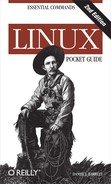Name
crontab — stdin stdout - file -- opt --help --version
Synopsis
crontab [options] [file]
The crontab command, like
at, schedules jobs for specific
times. However, crontab is for
recurring jobs, such as “Run this command at midnight on the second
Tuesday of each month.” To make this work, you edit and save a file
(called your crontab file), which
automatically gets installed in a system directory (/var/spool/cron). Once a minute, a Linux
process called cron wakes up,
checks your crontab file, and executes any jobs that are
due.
-
$ crontab -e Edit your crontab file in your default editor (
$EDITOR)-
$ crontab -l Print your crontab file on standard output
-
$ crontab -r Delete your crontab file
-
$ crontab myfile Install the file myfile as your crontab file
The superuser can add the option -u username to
work with other users’ crontab files.
Crontab files contain one job per line. (Blank lines and
comment lines beginning with “#” are ignored.)
Each line has six fields, separated by whitespace. The first five
fields specify the time to run the job, and the last is the job
command itself.
- Minutes of the hour
Integers between 0 and 59. This can be a single number (
30), a sequence of numbers separated by commas (0,15,30,45), a range (20–30), a sequence of ranges (0-15,50-59), or an asterisk to mean “all.” You can also specify “everynth time” with the suffix/n; for instance, both*/12and0-59/12mean0,12,24,36,48(i.e., every 12 minutes).- Hours of the day
Same syntax as for minutes.
- Days of the month
Integers between 1 and 31; again, you may use sequences, ranges, sequences of ranges, or an asterisk.
- Months of the year
Integers between 1 and 12; again, you may use sequences, ranges, sequences of ranges, or an asterisk. Additionally, you may use three-letter abbreviations (
jan,feb,mar, ...), but not in ranges or sequences.- Days of the week
Integers between 0 (Sunday) and 6 (Saturday); again, you may use sequences, ranges, sequences of ranges, or an asterisk. Additionally, you may use three-letter abbreviations (
sun,mon,tue, ...), but not in ranges or sequences.- Command to execute
Any shell command, which will be executed in your login environment, so you can refer to environment variables like
$HOMEand expect them to work. Use only absolute paths to your commands (e.g., /usr/bin/who instead ofwho) as a general rule.
Some example time specifications are:
* * * * *
|
Every minute |
45 * * * *
|
45 minutes after each hour (1:45, 2:45, etc.) |
45 9 * * *
|
Every day at 9:45 am |
45 9 8 * *
|
The eighth day of every month at 9:45 am |
45 9 8 12 *
|
Every December 8 at 9:45 am |
45 9 8 dec *
|
Every December 8 at 9:45 am |
45 9 * * 6
|
Every Saturday at 9:45 am |
45 9 * * sat
|
Every Saturday at 9:45 am |
45 9 * 12 6
|
Every Saturday in December, at 9:45 am |
45 9 8 12 6
|
Every Saturday in December, plus December 8, at 9:45 am |
If the command produces any output upon execution, cron will email it to you.
